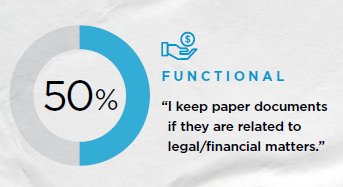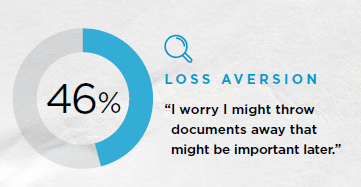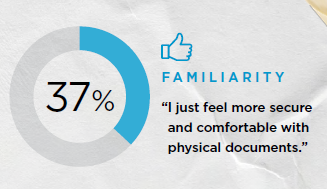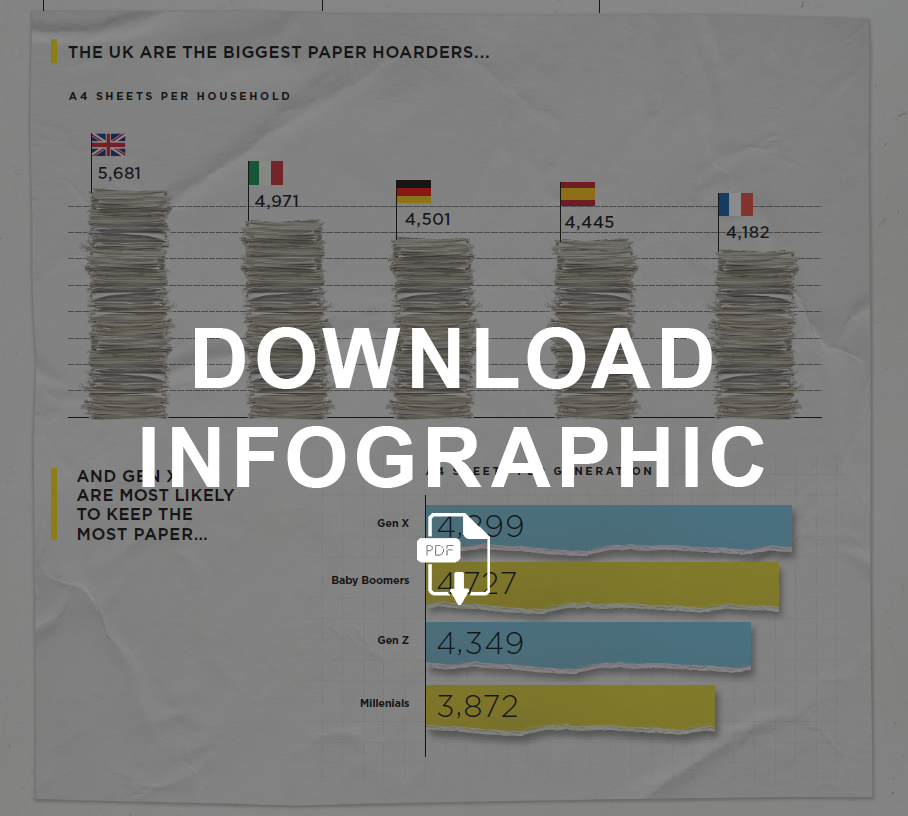Look around you. Whether you’re at your office desk or at home, you’re likely to see plenty of paper. That’s because, according to new research by ScanSnap – carried out to understand better how people manage their relationship with paper – the average UK household contains 5,681 A4 sheets of paper. In total, that’s over 160 billion sheets across the whole of the UK. If stacked, that’s enough to reach the height of the Shard building in London 49 thousand times!
In today’s digital age, when it is possible (and easy) to keep those documents in digital form, it is worth asking the question: why do people cling to paper documents despite the growing ease of digital alternatives, and the practicality digitised documents can bring? Especially as paper hoarding can impact things like productivity and even stress.
Our research showed there are several psychological drivers contributing to people’s attachment to paper…
Functionality

People can feel pressured to keep specific documents because of traditional perceptions around their importance. The research also showed 83% of people think it’s important to keep paper documents – and the most significant driver is the need to keep paper versions for legal or financial purposes.
In one sense, this functional approach is understandable, given the historic importance society has placed on these types of documents. On the other hand, isn’t it better to keep these documents digitised for safe-keeping? The last thing anyone needs is coffee spilt over their marriage certificate or their university degree. A digital document that is safe from mishaps is a lot more practical in the end.
Plus, more and more institutions are shifting towards digital transformation and gradually accepting digital-only documents. The thought process behind keeping paper documents because it is the “most functional” option is becoming outdated as digital becomes the preferred option in many instances. For example, in the UK you can keep tax and pay records “on paper, digitally, or as part of a software program”. Meanwhile, France is in the process of introducing new laws that mean all businesses must bill digitally and e-invoicing will soon by mandatory. In Italy, the legal validity of electronic documents dates back to 1997.
“Just in case”

According to the ScanSnap research, 76% of people hold onto their paper “just in case”. This is a fear of discarding physical documents based on the idea they might be needed in the future. This precautionary mindset can lead to individuals hoarding paper. Even if, in reality, that ‘just in case’ moment often never arrives, and they end up holding onto the physical forms of documents in perpetuity.
The silent generation (those born between 1928 and 1948) are the most likely to lean into this mentality. But more and more people appear aware that it might not be the most logical approach, with 67% of people admitting there is a lot that they have kept that probably won’t be needed anymore.
Loss aversion

This is the anxiety some people feel around potentially losing critical information. This worry, that documents won’t be accessible when needed, can lead to an over-reliance on keeping physical copies that could be far easier to have close to hand and accessible in digital form.
Our research showed almost half of people (46%) cite loss aversion as the main reason they hold on to their paper documents, and worry is the emotion that most people associate with the prospect of losing them.
Familiarity

It can be human nature to stick to what you know. And, when it comes to looking after documents, that usually means keeping them stored in physical form. 22% say they keep paper versions of documents because “it’s just what I’ve always done” and they have “never thought of storing this digitally”.
That familiarity is leading a lot of people to hoard paper because they feel more secure and comfortable doing so and, perhaps, are unaware of the accessibility and ease of digitising documents today.
Older generations, namely the Silent Generation and Baby Boomers, are particularly susceptible to this, according to our research. This could be linked to another psychological driver – cognitive ease – where people find paper documents easier to read.
Psychological impact
These psychological factors can significantly impact daily life and your wellbeing when they lead to paper hoarding. From reduced productivity and increased clutter at home and work, to added stress. 68% of people find it stressful if their home or workspace is cluttered and two-thirds are actively seeking less clutter in these spaces.
Embracing a paper-light environment could be a transformative experience. For example, swapping piles of paper on your desk or hidden away in boxes that rarely see the light of day for documents that are saved and managed digitally can take away some of the stress people have around losing or misplacing documents.
Digital solutions also address “just in case” concerns by ensuring documents are always available and easily searchable. Finally, switching to a digital-first approach can revolutionise your workspace and your home, making it cleaner and more organised and, ultimately, improving your life.
ScanSnap solutions
Of course, such changes, no matter how compelling the reasons behind them, need to be made as simple as possible. ScanSnap is the hardware and software solution that makes it easy for you to digitise your life so that you can focus on the things that matter. You don’t need to be an IT expert – you just need to touch a button. The ScanSnap range of scanning solutions includes a number of features that help overcome the psychological drivers causing people keeping more paper than they need to.
You can scan to cloud services to create digital documents that are hyper-functional. This cloud-based storage creates a seamless scanning and storage experience and means documents can be kept in a secure environment. For those “just-in-case" moments when you need a document ASAP, each scanned document is categorised and organised for easy access.
ScanSnap also makes smart scanning simple for even those who aren’t used to digitising their documents. With just one press of a button, you can share scanned documents with friends, family, and colleagues via email – adjusting to the new digital way of work and home life. And, you don’t have to stress when looking high and low for a document that contains vital information. The searchable in-document text feature saves time searching for the information you need in a large document by allowing you to search for specific words or details.


